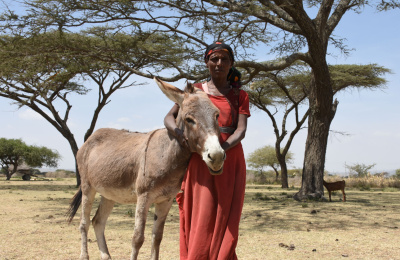This World Food Day we are looking to donkeys like Diamond - who are loved and cherished by farmers in some of the most barren areas of Namibia.
The Namib Desert in Namibia's Erongo Region is an unforgiving environment. With soaring temperatures and frequent sandstorms, the small ǂAonin community who live there have to band together to face the elements, as they have done for the last 8000 years.
There are few permanent jobs in the area, with a small number of the community generating income from some small-stock farming or casual work in the coastal town of Walvis Bay, 35 km (22 miles) to the west.
In recent generations, however, donkeys have come to play a vital role in continuing this ancient, 8000-year-old harvesting tradition by helping collect !nara melons.
For Stella !Goramus, the !nara fruit growing on the spiny bushes in the Namib Desert are a lifeline.
“The only money I get is from harvesting !naras,” says Stella, for whom !nara farming provides essential income to support her and her twin sons.
“Donkeys are our right hand. My two donkeys are my only transport. If I didn’t have donkeys, I would have to carry everything myself.” - a task that would be impossible, given that Stella is also constantly caring for her two sons.
“My donkeys don’t get sick like my cattle and goats. They eat anything - I don’t have to buy food for them as there is enough veld food. Ultimately, they are our diamonds, our pets. That’s why I called one of my two donkeys ‘Diamond’.”
Diamond and the other donkeys eat indigenous plants including steekgras, Anaboom (Faidherbia albida) pods, !nara melons and the soft growing stem tips of these plants.
During the annual harvest, which starts each November, Stella hand-picks ripe !naras, loads them into her donkey cart and transports them back to a temporary camp.
Stella's donkeys are not only diamonds in her eyes - they are also adored by her young sons, too.
“My twins love donkey cart rides. When they play, they pretend to drive donkey carts or to be donkeys – this was one of their first games,’ adds Stella.
Without her donkeys, Stella would not be able to put food on the table for her family.
After the harvest, as the low, heavy mist rolls off the Atlantic Ocean into the dunes and the sure and steady Diamond will steer Stella and her twins safely home. “My donkeys can see in the dark, and know where to go,” smiles Stella.







